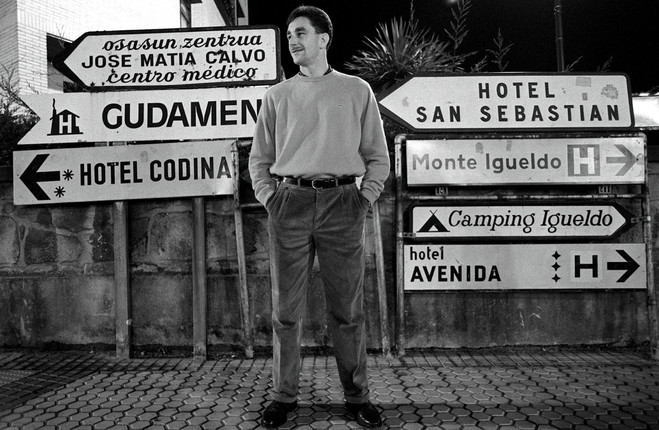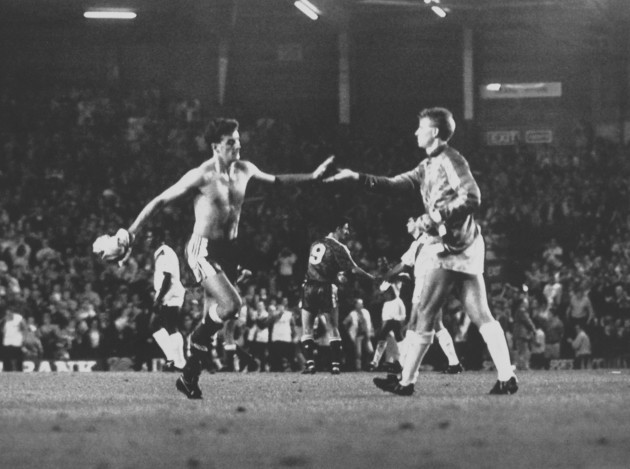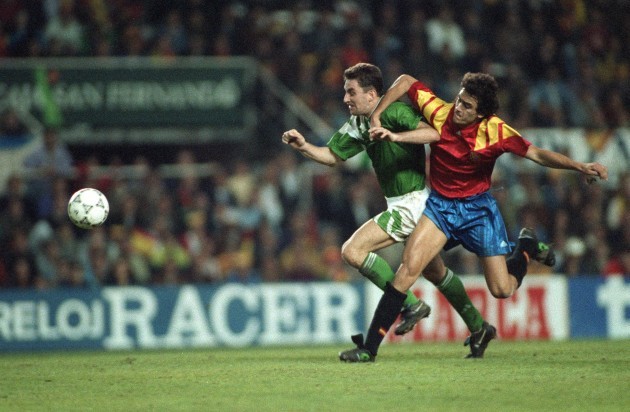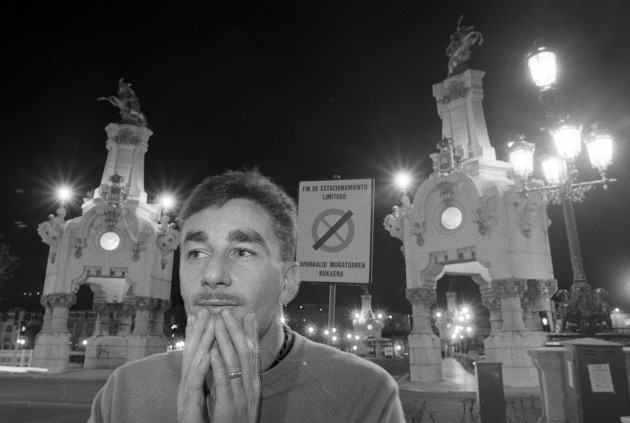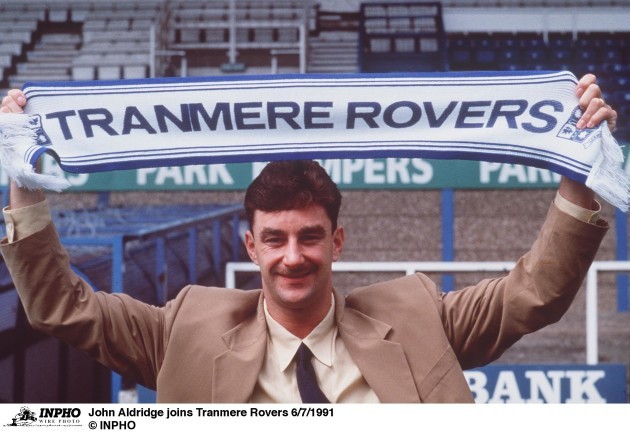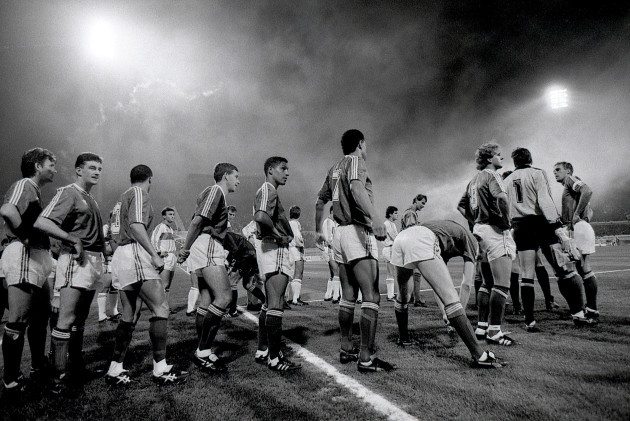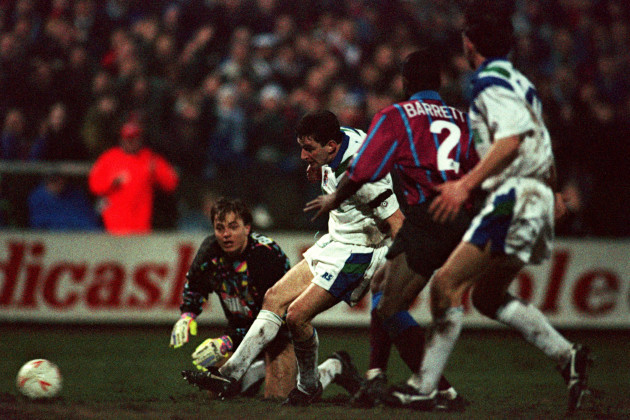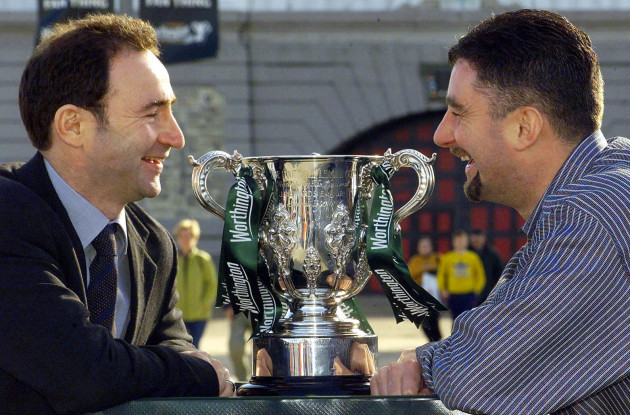LAST UPDATE | 21 Aug 2021
A WEEK BEFORE one of the worst days of John Aldridge’s life, he and his wife were involved in a road accident when their car crashed into a lamppost after spending the day at the Grand National at Aintree.
It was 8 April 1989.
Liverpool kicked off at 11.30 that morning and cruised to a 5-1 win over Sheffield Wednesday. It was one of those rare days in a season which Aldridge, who finished as the club’s top scorer with 31 goals in all competitions, did not find the net.
Still, a day at the races beckoned. As the crowd of 39,672 drifted out of Anfield, Aldridge was not alone in making the five-mile trip in plenty of time for the 3.20 at Aintree.
After the crash, the pair appeared in court and were bound over to keep the peace, with charges of drunken disorderly dropped. It was the last thing Aldridge – or Liverpool – needed as Arsenal pushed them all the way in the title race.
And then everything changed.
Hillsborough, 15 April.
Ninety-seven Liverpool supporters would eventually lose their lives because of a fatal crush in the Leppings Lane end.
A coroner later ruled they had been unlawfully killed, and it was only this month that Andrew Devine, who died on 27 July, 32 years after suffering life-changing injuries that day, became the 97th victim.
A minute’s silence will be held ahead of Liverpool’s game with Burnley at Anfield this afternoon.
“Lee Nichol from Bootle was 14 but looked about 10,” Aldridge later wrote in his autobiography. “He reminded me of my son, Paul. Lee was in the middle of the crush but was still alive when he was pulled out.
I went to see him in hospital. He looked a lovely kid. As he lay there in a coma, I whispered words into his ears. I asked the doctor about his chances of recovery. ‘He’s clinically dead, John,’ he said. That ripped into me. My heart went out to Lee’s family, decent people who didn’t deserve to be victims of such a tragedy.”
In the immediate aftermath of Hillsborough, Aldridge spoke to the Liverpool Echo and said he didn’t care if he ever played football again. His own father was at the back of the terrace, friends too. They survived.
The Republic of Ireland had a crucial 1990 World Cup qualifier at home to Spain 11 days later, but Aldridge was still too emotionally, mentally and physically drained to travel.
Spanish manager Luis Suarez left Jack Charlton speechless with his crude comments about the striker’s absence. “It is a decision I could not accept,” Suarez said. “That attitude won’t get anyone anywhere. I can understand him being upset but you won’t solve anything by not playing football.”
Ireland beat Spain 1-0.
Football carried on. Aldridge did too.
The English season was extended and from 10 May to the final day on 26 May, Liverpool played six games, with the FA Cup final against Everton among them.
Aldridge scored the opening goal at an emotionally-charged Wembley as they beat Everton 3-2 after extra-time.
He also netted in four of the last five league games – but was unable to keep the scoring run going on that final night, when Arsenal won 2-0 on a historic night at Anfield to pip Liverpool to the title on goal difference.
The summer came and a rest was needed.
Little did he know it was his last as a Liverpool player, although Aldridge did start the new 1989/90 season on Merseyside.
His final appearance for the club came as a substitute in a 9-0 romp over Crystal Palace on 12 September. He knew a £1.25 million transfer to Real Sociedad (or around 200 million Pesetas) was practically completed – despite Queens Park Rangers and Coventry City trying to hijack it – as he watched from the bench.
But when Liverpool were awarded a 67th-minute penalty, manager Kenny Dalglish showed his soft side by bringing him on to take it. Aldridge ran straight to the spot in front of the Kop, where John Barnes handed him the ball, to stroke in the sixth of the night.
It ended with him standing in front of that same terrace topless and with no boots, after throwing them into the crowd at the final whistle.
So, after finishing the previous season as top scorer and barely a week before his 31st birthday, Aldridge became the first non-Basque to sign for La Real after they lifted their ban on signing foreigners.
“Aldridge will receive a spacious rent-free house overlooking the famed Concha beach, a car, plus a £3,000-a-week contract,” The Evening Press reported.
The previous six months had taken its toll, and the realisation of his two and a half years at the club coming to an end hit hard.
“Next to my family it’s my life, it has been for years,” he said. “I say that with a lump in my throat. It’s sad for me but I suppose it’s good business. I’m 30 going on 31, so to get £1m for a player that age is a lot of money.
“However, I know I’ve got a couple of good years left and could still do it here if given the chance… But it’s a new world for me now.”
A correspondent was quickly dispatched to San Sebastian for Aldridge’s debut for Real Sociedad in their derby with Osasuna.
Although judging by the description of him as “Spain’s latest highly paid football mercenary” this wasn’t going to be a fluff piece.
Indeed, Aldridge revealed that he had to be subbed 20 minutes into his big unveiling by what’s described as “Spanish tummy”.
But he was adamant he had the stomach for the fight, even if he was unsure of the formation he was now playing.
“I cannot really explain Real’s system, it’s better to draw it,” he said, the reporter explaining how Aldridge drew a 3-3-3 graph with a lone striker up front.
While some supporters protested the decision of the club to no longer stick to their Basque-only policy, others at the old Atocha Stadium still welcomed the Scouser-cum-Irishman.
A banner reading Atocha KOP was draped behind one goal, with Aldridge drawn in the caricature of a wolf with his tongue sticking out.
There were also Union Jacks peppered around the ground, despite the fact he was an Ireland international. “A genuine error,” Aldridge acknowledged.
“But there again, I was born in Liverpool, wasn’t I? The atmosphere is really great but I’ve got to score goals.”
And he did.
By the following March he became the first player in the club’s 86-year history to score in six straight games. A local butcher promised Aldridge a kilo of sausage and two bottles of wine for every goal he scored if he could break the record – he got a delivery of 20 kilos of sausage of 40 bottles of wine.
Qualification for the Uefa Cup, not to mention a place in Ireland’s World Cup squad, were further bonuses at the end of that first season. And while the goals continued in his second, there were also stories of unrest seeping back to the British media.
On one occasion, after an interview appeared in which Aldridge was scathing of the dressing room culture and his family being unable to settle, a signed statement by Aldridge countering the claims was sent to local TV, radio and newspaper.
“I want to make it clear that what the English newspapers quote me as saying is false. On the contrary I am very happy. I have received everyone’s support, along with the friendship and affection of the whole city of San Sebastian whose people have welcomed me and my family,” it read.
Just over a year later and Aldridge departed for Tranmere Rovers – newly-promoted from the Third Division. Before he did, he continued to show his class as he embraced his advancing years.
He scored a hat-trick for Ireland against Turkey at Lansdowne Road during the ultimately unsuccessful Euro 92 qualifying campaign – half his six-goal tally in his first 40 caps.
In his first season in La Liga his 16 goals saw him finish fourth in the Pichichi standings. He then pushed Real Madrid’s Emilio Butragueno even further during the following campaign, his 17 goals just three shy of claiming the famed top marksman’s trophy.
And even though Aldridge requested to leave with a year left on his contract, he retains a special place in La Real hearts, not least because of his eight goals in six games against Barcelona, with six coming at the Nou Camp – including a brace in a 3-1 win in May ’91, which is still the last time they’ve won there.
After two years away from Merseyside and comprehending the horror of what happened in the months before his departure, Aldridge was ready to return, and he made that known to another former Liverpool hero, La Real manager John Toshack.
Or at least come back to the other side of the river.
Tranmere Rovers sealed promotion to the Second Division under the guidance of manager John King, with the ambitious chief executive, Frank Corfe, declaring in the summer of 1991:
“Any talk about players coming in is purely speculative. However, we would like to bring in a big name. I would have thought that moving to an up-and-coming club like Tranmere would be a mouthwatering prospect for many a world-class player.”
There wasn’t much of a transfer saga. Leeds United showed brief interest but nothing concrete and, despite his impressive return in Spain, top-flight clubs were steering clear.
Aldridge’s old club Liverpool paid Derby County a then-British record £2.9m for Dean Saunders, while Aston Villa’s David Platt left England for Bari in a £5.5m transfer, with Steve Staunton heading to Villa Park from Anfield for £1.6m.
Teddy Sheringham left Millwall for Nottingham Forest for £2m, and Manchester United parted with a mere £750,000 for a Danish goalkeeper at Brondby by the name of Peter Schmeichel.
Aldridge did eventually join that money list, putting pen to paper on a three-year deal after a £250,000 fee was agreed – a move which soon paid off not only with goals but also revenue, as season ticket sales increased by 3,000 on the previous campaign.
“Fair play to Tranmere for coming in and snapping me up when the majority of First Division managers were running scared of me,” Aldridge admitted.
Money flowed in the English game but, at the same time, Diego Maradona’s collection of luxury cars worth £600,000 – two Ferraris, a Rolls Royce and BMW – were put for sale as he left Napoli.
Promotion was the aim for Tranmere, who also added Scottish winger Pat Nevin to the squad, as they tried to bring the Birkenhead club to the top tier, just a year before the inaugural Premier League.
For a while it looked as though Aldridge’s goals would get them there, picking up where he left off in Spain, going on a streak from August to November which saw the 33-year-old score 25 goals in 24 games.
He was out in front across all four divisions with talk of matching Dixie Dean’s record of 63 during 1927/28 emerging. Still, not everything was plain sailing.
The famous “Aldo shimmie” penalty caused more than a few rows throughout the season, Chelsea goalkeeper Kevin Hitchcock and midfielder Denis Wise booked for a confrontation with him after his stuttering run up and tidy finish knocked them out of the League Cup.
“The goalkeeper can’t move until I have actually touched the ball anyway so I can do whatever I like on the run up – even a back flip,” Aldridge laughed.
Promotion proved a step too far, but 36 goals saw the veteran named in the PFA Team of the Year for the Second Division and also saw him make the shortlist for overall Player of the Year, which was collected by Manchester United’s Gary Pallister.
His top-flight career in England was over, and a new journey was underway with Tranmere, eventually becoming manager and leading them to the 2000 League Cup final where Martin O’Neill’s Leicester City triumphed.
But as a player, goals were a constant companion for John Aldridge.
